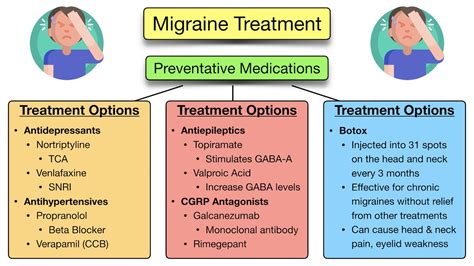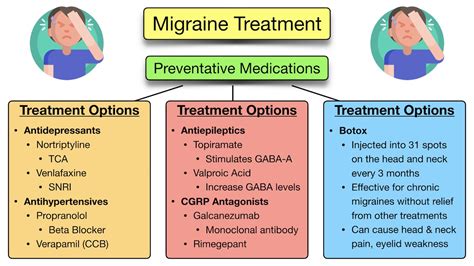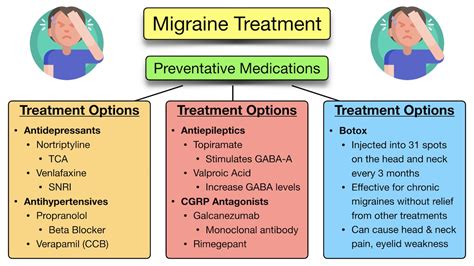Intro
Discover the top 5 headache drugs, including prescription and OTC medications, to alleviate migraine and tension headaches, with expert insights on pain relief, dosage, and side effects of popular headache treatments.
Headaches are a common health issue that affects millions of people worldwide. They can be caused by a variety of factors, including stress, lack of sleep, dehydration, and certain medical conditions. While there are many ways to manage headaches, including lifestyle changes and alternative therapies, medications are often the first line of treatment. In this article, we will explore the top 5 headache drugs, their mechanisms of action, benefits, and potential side effects.
Headaches can be debilitating and disrupt daily life, making it essential to find effective treatments. The top 5 headache drugs are prescribed by doctors to alleviate headache symptoms and improve quality of life. These medications have been extensively researched and tested, and their effectiveness has been proven in numerous clinical trials. By understanding how these medications work and their potential benefits and risks, individuals can make informed decisions about their treatment options.
The treatment of headaches has evolved significantly over the years, with a growing focus on targeted therapies and personalized medicine. The top 5 headache drugs represent a range of medication classes, each with its unique mechanism of action and benefits. From over-the-counter pain relievers to prescription medications, these drugs offer hope for individuals suffering from headaches. Whether you are experiencing occasional headaches or chronic migraine, understanding the top 5 headache drugs can help you navigate the complex world of headache treatment.
Introduction to Headache Medications

Headache medications can be broadly classified into two categories: over-the-counter (OTC) and prescription medications. OTC medications, such as acetaminophen and ibuprofen, are available without a prescription and are often used to treat mild to moderate headaches. Prescription medications, such as triptans and ergots, are more potent and are typically used to treat more severe headaches, including migraines.
How Headache Medications Work
Headache medications work by targeting specific pathways in the brain and nervous system. Some medications, such as pain relievers, work by blocking pain signals to the brain, while others, such as triptans, work by constricting blood vessels and reducing inflammation. Understanding how headache medications work can help individuals make informed decisions about their treatment options and minimize potential side effects.Top 5 Headache Drugs

The top 5 headache drugs are:
- Acetaminophen (Tylenol)
- Ibuprofen (Advil, Motrin)
- Sumatriptan (Imitrex)
- Rizatriptan (Maxalt)
- Eletriptan (Relpax)
Acetaminophen (Tylenol)
Acetaminophen is a popular OTC pain reliever that is commonly used to treat headaches, including tension headaches and migraines. It works by blocking pain signals to the brain and reducing fever. Acetaminophen is generally well-tolerated and is available in a range of formulations, including tablets, capsules, and liquids.Ibuprofen (Advil, Motrin)
Ibuprofen is another OTC pain reliever that is commonly used to treat headaches, including migraines and cluster headaches. It works by reducing inflammation and blocking pain signals to the brain. Ibuprofen is generally well-tolerated, but it can cause stomach upset and interact with other medications.Prescription Headache Medications

Prescription headache medications are more potent than OTC medications and are typically used to treat more severe headaches, including migraines. These medications can be classified into several categories, including triptans, ergots, and corticosteroids.
Sumatriptan (Imitrex)
Sumatriptan is a triptan medication that is commonly used to treat migraines. It works by constricting blood vessels and reducing inflammation. Sumatriptan is available in a range of formulations, including tablets, injections, and nasal sprays.Rizatriptan (Maxalt)
Rizatriptan is another triptan medication that is commonly used to treat migraines. It works by constricting blood vessels and reducing inflammation. Rizatriptan is available in a range of formulations, including tablets and orally disintegrating tablets.Eletriptan (Relpax)
Eletriptan is a triptan medication that is commonly used to treat migraines. It works by constricting blood vessels and reducing inflammation. Eletriptan is available in a range of formulations, including tablets.Benefits and Risks of Headache Medications

Headache medications can provide significant benefits, including rapid pain relief and improved quality of life. However, they can also have potential risks and side effects, including stomach upset, dizziness, and interactions with other medications. It is essential to weigh the benefits and risks of headache medications and to use them responsibly.
Common Side Effects of Headache Medications
Common side effects of headache medications include: * Stomach upset * Dizziness * Nausea * Vomiting * Headache reboundInteractions with Other Medications
Headache medications can interact with other medications, including blood thinners, antidepressants, and blood pressure medications. It is essential to inform your doctor about all medications you are taking before starting a new headache medication.Conclusion and Next Steps

In conclusion, the top 5 headache drugs offer hope for individuals suffering from headaches. By understanding how these medications work and their potential benefits and risks, individuals can make informed decisions about their treatment options. If you are experiencing headaches, it is essential to consult with your doctor to determine the best course of treatment.
Future Directions in Headache Treatment
Future directions in headache treatment include the development of new medications and therapies, such as CGRP inhibitors and neuromodulation devices. These innovative treatments offer hope for individuals suffering from headaches and may provide more effective and targeted relief.What are the most common types of headaches?
+The most common types of headaches include tension headaches, migraines, and cluster headaches.
How do I know which headache medication is right for me?
+It is essential to consult with your doctor to determine the best course of treatment for your headaches. Your doctor will consider your medical history, symptoms, and lifestyle to recommend the most effective medication.
Can I take headache medications with other medications?
+It is essential to inform your doctor about all medications you are taking before starting a new headache medication. Headache medications can interact with other medications, including blood thinners, antidepressants, and blood pressure medications.
We hope this article has provided you with a comprehensive overview of the top 5 headache drugs. If you have any questions or comments, please do not hesitate to reach out. Share this article with your friends and family to help raise awareness about headache treatment options. Together, we can work towards finding effective solutions for headache sufferers and improving quality of life.
